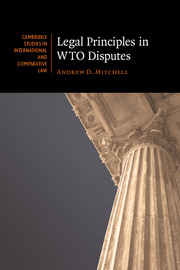1 - Introduction
Published online by Cambridge University Press: 27 February 2010
Summary
[C]an we refer to a rule of general international law such as good faith? Can we have a legal system without the rule of good faith? … Can there be any system of law that can work without a reasonable concept of proportionality?
Professor Georges Abi-Saab, Appellate Body member, World Trade OrganizationBeyond the ostensible
Having passed its thirteenth anniversary, the World Trade Organization (WTO) has become one of the most important international organisations in existence. As the only global intergovernmental organisation concerned with the rules of trade between nations, it is the leading forum for trade negotiations and for the resolution of trade disputes. Its dispute settlement system has attracted enormous interest because of its binding, rule-oriented nature and its well-established appeals system, both a rarity at the international level. More than 360 disputes have been brought to the WTO since its creation in January 1995, and the recommendations of WTO Panels and the Appellate Body frequently generate intense controversy. These recommendations often require Members to change their measures to bring them into compliance with WTO obligations, which may have significant economic consequences for companies, consumers and workers, as well as major political implications for governments. Panel and Appellate Body reports are therefore carefully scrutinised, and WTO Members and academics alike are quick to pounce on perceived failures in the resolution of disputes under the Dispute Settlement Understanding (DSU).
- Type
- Chapter
- Information
- Legal Principles in WTO Disputes , pp. 1 - 28Publisher: Cambridge University PressPrint publication year: 2008
- 1
- Cited by



